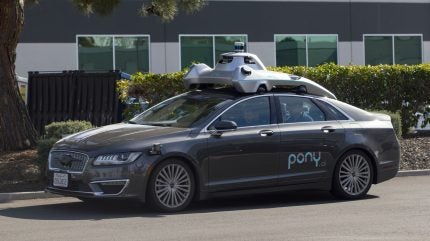
Pony AI is advancing its autonomous vehicle production, with over 200 Gen-7 robotaxi models already manufactured in partnership with Guangzhou Automobile Group (GAC) and Beijing Automotive Industry Corporation (BAIC).
The company says it is on a clear trajectory to reach its goal of a 1,000-vehicle fleet by the end of 2025.

Discover B2B Marketing That Performs
Combine business intelligence and editorial excellence to reach engaged professionals across 36 leading media platforms.
Pony AI reported a net loss of 381.6m yuan ($53.3m) for the second quarter (Q2) 2025, which is an increase from the $30.9m loss in the previous year period.
The non-GAAP net loss also grew to $46.1m from $30.3m year-over-year (YoY). The loss from operations widened to $61.3m in the quarter, up from $37.0m in the previous year’s quarter.
However, Pony AI has seen a 75.9% increase in total revenues to $21.5m (153.7m yuan) in Q2 2025, compared to the same period in the previous year. This growth has been largely attributed to the substantial rise in robotaxi services revenues, which soared by 157.8% to $1.5m (10.9m yuan).
The company attributes this to the expanding user adoption, heightened demand in tier-one cities, and an enlarged fleet of robotaxi vehicles. Furthermore, fare-charging revenues have surged by over 300% YoY.
In terms of partnerships, Pony AI has entered into a strategic agreement with Shenzhen Xihu to jointly deploy over 1,000 Gen-7 robotaxis in Shenzhen in the coming years. This move is expected to significantly enhance the company’s service offerings and market presence.
Additionally, the company has secured testing permits for its Gen-7 robotaxis in all four tier-one cities in China, which is a critical step towards wider public-facing commercial deployment.
Pony AI has also launched fully driverless commercial robotaxi services in Shanghai’s Pudong New Area and extended service coverage to 24/7 in select regions of Guangzhou and Shenzhen to meet increasing user demand.
Internationally, Pony AI is partnering with Dubai’s Roads and Transport Authority (RTA) aimed at integrating its autonomous driving technology into Dubai’s future transportation network. The collaboration will begin with supervised robotaxi trials in late this year.
The company’s operational footprint extends to South Korea, where it has secured nationwide permits and is navigating complex urban traffic in Seoul’s Gangnam district, including during challenging winter conditions.
Road testing in Luxembourg has also commenced in partnership with Emile Weber, further showcasing Pony AI’s commitment to expanding its global reach.
Pony.ai CEO and chairman Dr James Peng said, “Since mass production started two months ago, over 200 Gen-7 Robotaxi vehicles have rolled off the production line, putting us firmly on track to hit the year-end 1,000-vehicle target.
“Our robust Robotaxi revenues more than doubled, with fare-charging revenues surging by over 300% year-over-year. The path toward positive unit economics is also clear, as we made substantial improvements in key cost items such as remote assistance and vehicle insurance.”






